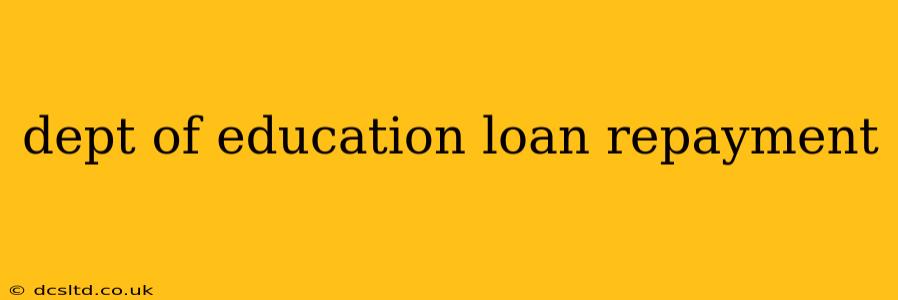Navigating the Department of Education's loan repayment system can feel overwhelming. This guide aims to clarify the process, addressing common questions and providing essential information to help borrowers manage their student loans effectively. Understanding your repayment options and exploring available programs is crucial to avoiding delinquency and achieving financial stability.
What are my repayment options for federal student loans?
The Department of Education offers several repayment plans tailored to different financial situations. These include:
-
Standard Repayment Plan: This plan spreads your loan payments over 10 years at a fixed monthly payment. It's the simplest option, but payments might be higher than other plans.
-
Graduated Repayment Plan: Payments start low and gradually increase over time. This can be helpful initially, but payments become significantly larger later in the repayment term.
-
Extended Repayment Plan: This plan stretches payments over a longer period (up to 25 years), lowering monthly payments. However, you'll pay significantly more in interest over the life of the loan.
-
Income-Driven Repayment (IDR) Plans: These plans link your monthly payment to your income and family size. There are several IDR plans, including Revised Pay As You Earn (REPAYE), Income-Based Repayment (IBR), Income-Contingent Repayment (ICR), and Pay As You Earn (PAYE). IDR plans can result in lower monthly payments, but you might end up paying more interest over time. After a specific period (usually 20 or 25 years), any remaining balance might be forgiven under certain circumstances.
-
Income-Driven Repayment (IDR) Plans: Which is right for me? Choosing the right IDR plan depends on your individual financial circumstances. REPAYE, for example, is generally more favorable to borrowers with higher incomes, while IBR might be better suited for those with lower incomes. Consult the Department of Education's website or a financial advisor for personalized advice.
How do I consolidate my federal student loans?
Consolidating your federal student loans combines multiple loans into a single loan with one monthly payment. This can simplify repayment management but may not always lower your overall interest costs. The interest rate on a consolidated loan is a weighted average of the interest rates of your existing loans. Consider the potential benefits and drawbacks before consolidating.
What is loan forgiveness and how can I qualify?
Loan forgiveness programs eliminate remaining loan balances after meeting specific requirements. These programs often require years of qualifying payments under an income-driven repayment plan and working in specific public service jobs (for example, teaching or working for a government agency). Eligibility criteria vary significantly by program. The Public Service Loan Forgiveness (PSLF) program is one example, but several other programs exist with different qualifying criteria. Keep in mind that eligibility requirements and program details are subject to change.
What happens if I default on my student loans?
Defaulting on your student loans has serious consequences. It can negatively impact your credit score, leading to difficulties obtaining loans, credit cards, or even renting an apartment. Wage garnishment, tax refund offset, and even legal action are possibilities. Contact the Department of Education immediately if you're struggling to make your payments to explore available options.
What resources are available to help me manage my student loan debt?
The Department of Education provides numerous resources to help borrowers manage their loans effectively. Their website offers detailed information on repayment plans, loan forgiveness programs, and other assistance options. Additionally, you can contact the Federal Student Aid Information Center for personalized assistance. Independent financial advisors can also provide valuable guidance in navigating the complexities of student loan repayment.
Disclaimer: This information is for general knowledge and informational purposes only, and does not constitute financial or legal advice. For personalized guidance regarding your student loans, consult a qualified financial advisor or the Department of Education directly. Laws and regulations regarding student loan repayment are subject to change, so it's essential to stay informed about the latest updates.
